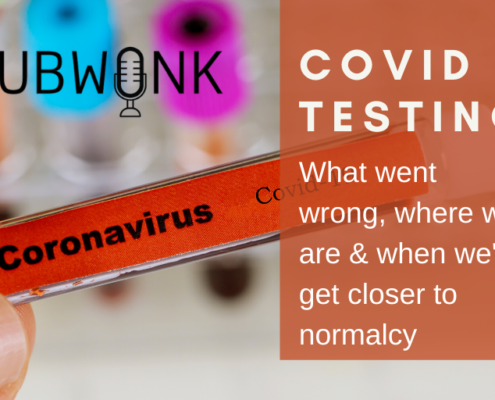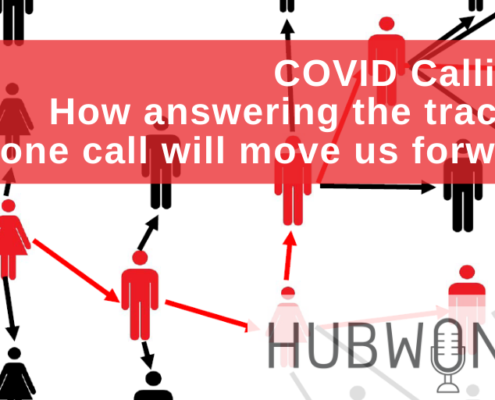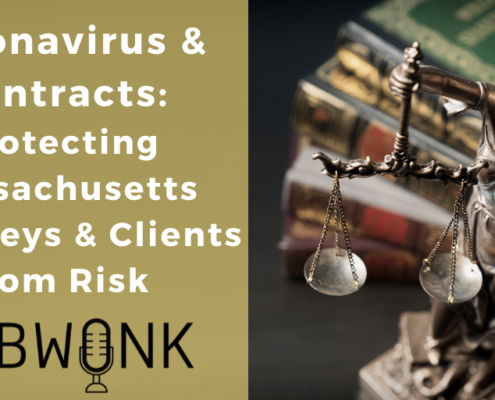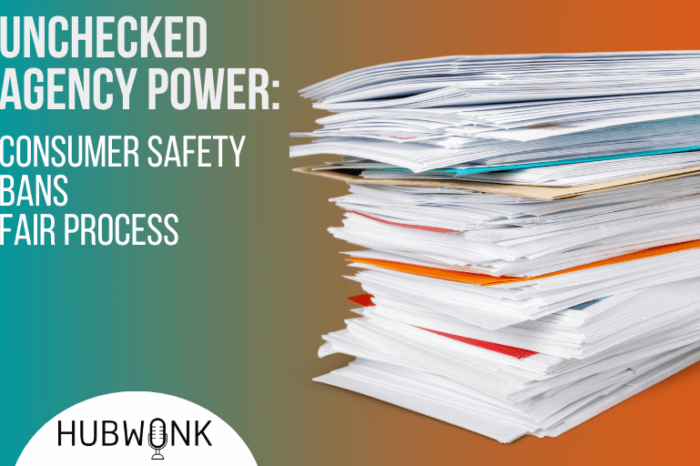Unchecked Agency Power: Consumer Safety Bans Fair Process
/0 Comments/in Featured, Podcast Hubwonk /by Editorial StaffJoe Selvaggi talks with Pacific Legal Foundation senior attorney Oliver Dunford about his work on Leachco v. Consumer Product Safety Commission, a case challenging the constitutionality of an executive agency structure (CPSC), in which leadership is beyond presidential removal, which uses its product safety mandate to ban products with no independent recourse for producers.
Guest:
 Oliver Dunford is a senior attorney at Pacific Legal Foundation. He litigates across the country to defend and advance individual liberty and the rule of law. Oliver’s cases involve the separation of powers, economic liberty, and property rights.
Oliver Dunford is a senior attorney at Pacific Legal Foundation. He litigates across the country to defend and advance individual liberty and the rule of law. Oliver’s cases involve the separation of powers, economic liberty, and property rights.
Oliver remains inspired by the classical liberal ideals upon which our Founders declared independence and secured the blessings of liberty. The Constitution’s promises, however, are not self-executing. As James Madison explained, “In framing a government which is to be administered by men over men, the great difficulty lies in this: you must first enable the government to control the governed; and in the next place oblige it to control itself.” Oliver feels lucky that his work helps oblige the government to control itself—to the end that all individuals may pursue their rights of life, liberty, and the pursuit of happiness.
Before joining PLF, Oliver clerked at the Ohio Supreme Court and the Ohio Court of Appeals, and spent more than a decade in private practice working on complex commercial litigation. Originally from Cleveland, Oliver is a graduate of the University of Dayton and Cleveland-Marshall College of Law, where he was a managing editor for the Cleveland State Law Review. Oliver is admitted to the state bars of Florida, California, and Ohio, as well as several federal courts including the United States Supreme Court.
WATCH:
Get new episodes of Hubwonk in your inbox!
Read a transcript of this episode.
Please excuse typos.
Joe Selvaggi: Welcome to Hubwonk, a podcast of Pioneer Institute, a think tank in Boston. Americans expect the product they buy to be safe to that end in 1972 Congress passed the Consumer Product Safety act created a Product Safety Commission to set standards and enforce bans, but the commission’s structure puts leaders beyond presidential removal and leaves the producers of banned products with no place for independent legal relief. Such concentration of authority creates a tension by leaving constitutionally divided powers of rulemaking rule enforcement and real challenges within a single unaccountable bureaucratic body. And that power to ban with no available independent appeal process is at the core of an ongoing lawsuit against CPSC brought by Leachco, a small female-founded product firm in Oklahoma after the Commission determined its Podster® baby lounger to be unsafe. This legal action appeals to the courts to determine the constitutionality of an executive agency structure to be answerable only to itself and asks that the target of their administrative actions be given the opportunity for their day in court. What are the implications of this case for the American public and could its outcome improve executive agency accountability and preserve the right for an independent judicial oversight so vital for a free society? My guest today is Oliver Dunford, a litigator representing Leachco in its case against the CPSC and a senior attorney for the Pacific Legal Foundation, which is a nonprofit legal organization that defends Americans liberties when threatened by government overreach. Attorney Dunford will discuss how the actions of the CPSC on Leachco shines a light on the power of executive agencies to deprive Americans of due process all while remaining beyond the reach of elected officials. He’ll share with us his views on meaningful reforms to such agencies that could return the three constitutionally divided powers to their proper place. When I return, I’ll be joined by Pacific Legal Foundation senior attorney Oliver Dunford. OK, we’re back, this is Hubwonk. I’m Joe Selvaggi, and I’m now pleased to be joined by senior attorney for the Pacific Legal Foundation, Oliver Dunford. Welcome to Hubwonk, Oliver.
Oliver: Thanks so much for having me.
Joe: Alright, a pleasure to have you. I’m very interested in today’s topic. We’re going to be talking in fact again for Hubwonk along about the Consumer Product Safety Commission. We’re going to talk about its structure and what we think about how it enforces its charter, then I want to talk to you about a case you have going up through the court system advocating for your client Leachco. But our listeners probably don’t understand the fundamentals of how commissions are set up, specifically the Consumer Product Safety Commission. So, let’s start at the beginning. Consumer safety sounds like a good thing; how is it, what is its charter, let’s start there.
Oliver: Sure, its main job is to protect the public against unreasonable risks of injury associated with consumer products and it was founded in the 70s although it had some history of other commissions or other agencies before that and so its job is to protect the public generally speaking from dangerous consumer products.
Joe: OK that sounds good and so to get that job done it has to first determine which products are unsafe. How does it do that, does it look to third-party labs or does it look at hazards in the community does it look to accident data where does it get this information how does it know what’s an unsafe product?
Oliver: Yeah, they do their own internal research they have a technical staff they also commissioned studies rely on third-party studies they get their information from everywhere part of their mission is in fact to provide information to consumers and to the general public about products.
Joe: So, it finds a product unsafe from its own analysis and it deems it unsafe and it says OK now we have a remedy I suppose there’s a range of remedies you mentioned one which is to inform the public that this is less than safe but of course another remedy would be to demand that the producer changed the way it makes its product or in fact make it pull the product and recall it. So, how does it determine which is the right solution to the unsafe product?
Oliver: I wish I knew specifically what they what their decisions were based on, but you’re right they do, the Commission does work with companies and industries to set standards; if they think a product is dangerous they will work with the company or they can work with the company to suggest changes but ultimately if the company doesn’t agree or for whatever reason they can ultimately tell the company that the product should be recalled, and one way they can do it they can just—they do this all the time it seems now—they can publish something on their website it tells the public to immediately stop using this product and then it can—but it doesn’t have to—follow that up with an official formal administrative action against the company.
Joe: OK, so, we found a bad product and we’ve decided it needs to be removed from the shelves. If I’m that producer of the product, what recourse do I have to that determination, meaning I think they found my product to be unsafe, I don’t agree, what recourse do I have?
Oliver: You can participate in the hearing. You can object to the initial decision and say that we would like a hearing, but that hearing of course is in front of the Commission itself. So, the commissioners vote to approve an administrative action. They appoint or assign an administrative law judge to hear the case and then on appeal the Commission itself hears the appeal, but that’s your recourse. You can participate in a hearing where the commission’s counsel will try to prove that the product is in fact defective or unreasonably dangerous.
Joe: So, we follow the process: You’ve got the agency determining which products are unsafe, determining the remedy, including pulling the product, and ultimately if you object as the producer they’re the body that you go to. So, forgive me for employing a cliche that they are judge, jury, and executioner, which, though it may sound harmless at one level sounds somewhat arbitrary at another level. Let’s talk about that then. If they seem internally, potentially arbitrary this is an executive branch department—don’t they ultimately answer to the president? If we had an agency run amok, wouldn’t we essentially have the president be able to say ‘Look, guys, you’ve gone too far. This is enough.’ What control does, let’s say, the executive branch have over this agency?
Oliver: For most agencies—and your listeners will of course know the State Department, Defense Department—and the secretaries of those departments can be removed by the president for any reason or no reason. If the Secretary of State is doing things that the president doesn’t like, the president can remove that secretary immediately. But the Commission, like a number of other agencies in the government, is what’s called an independent agency, and these agencies are supposed to be—they were established to be experts in a certain field—they’re supposed to merely administer the law with dispassion, they’re supposed to avoid politics, and in order to do that, the argument goes, the leaders of these commissions should be protected somewhat from presidential removal. So, unlike say the Secretary of Defense, the commissioners of the CPSC cannot be removed by the president except for malfeasance in office or neglect of duty. So, what that means is a mere policy difference between the president and the commissioner—or even some egregious behavior that doesn’t reach the level of malfeasance in office—is not enough to remove a commissioner. They’re set to establish terms and they can serve out their term unless, again, the president can show that they have neglected their duty or committed malfeasance in office.
Joe: So, I’m going to wade into an area that I’m an amateur, but our listeners may be even less familiar. We have plenty of shows, episodes about our wonderful Constitution, Article I, Article II, Article III. Article I is, you know, it’s Congress and they make the laws, and Article II is the executive branch. They execute those laws. Article III, of course, is the judicial oversight, but the executive branch really is constitutionally responsible to make sure the laws are carried out, in their view, the way they want them to. If there’s a conflict in vision of what the agency should be and the president and the organization don’t agree, effectively then, this would preclude the president from executing his constitutional responsibility, which is to carry out the laws as he sees them. Is this—am I accurate in this estimation here?
Oliver: Yeah, that’s exactly right, and the Supreme Court in recent cases has said that these agencies need to be accountable to the president because the president is accountable to us, and to paraphrase Chief Justice Roberts, in one of those cases the buck stops somewhere else. So, presidents kind of like it when they can blame—‘well, that’s just the actions of an independent agency,’ and a good example is the CPSC’s recent—one of the commissioner’s recent statements—about banning guest stoves. The point was, well, that’s an independent agency and so the president can’t directly control what they do. A similar case arose a number of years ago with respect to net neutrality. The FTC or now—I can’t remember which agency, but an agency involved—the FCC—involved in the net neutrality issue was making these policies that the administration did not necessarily agree with, and so it does present a problem when these agencies can act independently of the president who, after all, is elected by the American public.
Joe: So, this provides some cover for either mistakes or deliberate disagreement or it provides cover for policymakers who ultimately are accountable to us. So, ultimately, it provides cover for bureaucrats from the American people.
Oliver: It protects the bureaucrats from the American people, it also protects not only the president, also protects Congress. They can say ‘Look, we passed the law and this expert agency is supposed to be taking care of these problems, don’t blame us if there are any problems, blame the agency.’
Joe: OK, well we’ve set the table here. I want to then move on to the specifics of the particular case that brought to light the challenges which happen when we have an agency that really doesn’t seem to be very responsive to the needs of the individual producers. So, let’s drill down. You have a case that is, I think, originally filed suit in the federal District Court in Oklahoma and it’s now on appeal in the 10th Circuit. The firm is Leachco, the case is Leachco v. Consumer Product Safety Commission. For our listeners, give us a sense of how this all plays out in real life. We’ve got a real company with a real product that the agency has deemed unsafe. Give us some background on Leachco and the product.
Oliver: Sure. Leachco is a small family company in Ada, Oklahoma that was founded in 1988, and the founder, Jamie Leachco, designed her first product by accident. Her son almost slipped out of a highchair when they were in a restaurant. She quickly fashioned a restraint, and she used it around town. People noticed, and she realized she was onto something, and she and her husband Clyde started the company in their home. They make a number of products, including those huge body pillows you may have seen. They make a number of maternity products, and the product that’s at issue in this case is called the Podster.® It’s an infant lounger. It looks kind of like an inner tube. You place the baby and it kind of snugs the baby and it’s there for when parents want to put the baby down for a few minutes while they’re playing with the child or interacting with him, but that’s the product that the Commission has its eyes set on. Leachco has sold 180,000 of these Podsters. They have included warnings—the Commission admits this, that the product has always come with warnings saying ‘do not use for sleep, constant adult supervision is always required.’ But, of course, accidents happen, Leachco can’t control all the ways their consumers will use the product and tragically three babies have died, allegedly associated with the product, although we think that in each case the problem was really the decisions by the caregivers and not the product itself that caused the death. But even if they were directly caused by the product that would be three deaths out of 180,000 Podsters, and if you consider that each Podster is used multiple times a week, the rate of injury is infinitesimally small. So, in any event, that’s what the Commission says is an unreasonably dangerous product.
Joe: indeed, I read in your brief that in one case it was used when two parents were sleeping and had the bed—used the Podster in their own bed. When the baby was found, the Podster wasn’t next to the baby, it was under the covers, so, in fact the baby started on the Podster didn’t end up there. Of course, any death is a tragedy, but it seems that’s a tenuous link to the Podster, and that terrible unfortunate—
Oliver: Yeah, and Jamie Leach is a registered nurse, she’s a mom and a grandmother, you know of course they don’t design these products to harm children. Nobody’s happy about that, and she’s always designed these products so that her children and grandchildren can use them safely.
Joe: So, now the weight of the federal government is on top of this small Oklahoma company, and this woman entrepreneur. Let’s just take a step back. I mentioned that you are a senior attorney at the Pacific Legal Foundation. For a moment I just want to focus on you. How is it that you have been able to come in and help this group? You’re a sophisticated attorney, you plead your cases before the U.S. Supreme Court. how is it they’ve had the benefit of such great counsel? What does Pacific Legal Foundation do?
Oliver: Well, we are a nonprofit legal foundation. We’re coming up on our 50th anniversary. We provide pro bono counsel to individuals and small businesses that we think are being taken advantage of by the government. We have a number of great donors who sponsor our work. It’s one of the great things I get to do is work without having to collect bills and I can tell clients not to charge you, and we work in three main areas—separation of powers, which is what this case involves, and we also do a lot of work in property rights and equality and opportunity, things like economic liberty and government overregulation of small businesses, including things like licensing restrictions that prevent competitors from entering the market.
Joe: So, this is a sort of classic case then for your organization. So, let’s talk about this Podster and the Leachco case. When Leachco was first notified that they would have to pull the product and absorb all the costs associated with that, what is the process for a firm like that when they get that letter in the mail? Do they literally have to immediately comply or what is their recourse and, you know, how does that play out?
Oliver: God forbid any of it happens. Many listeners probably know first what to do and we were not involved when they first received notice from the Commission, and when the administrative proceeding started today appears to work from what I’ve been able to gather now studying up on the Commission, is after they do their technical investigation and do some other looking around they will contact the company and tell the company that an investigation is ongoing and it gives the opportunity—or the company an opportunity—to respond, of course. That’s tricky. You want to cooperate with an agency that has oversight over what you’re doing, but you also don’t want to turn over every piece of information, because who knows what the government will do with it? Generally, companies cooperate. For one thing, they want to stay out of the news, and this is true across the government. You know, the SEC is always investigating securities companies and the FTC is investigating companies for supposedly anticompetitive behavior, and nobody wants their company’s name in the paper as being under investigation. But, if they don’t get anywhere, or if the agency finds that either the product in this case can be made safer or that the company should recall the product, then it takes it to the next step, which is, as I mentioned, publishing on their website that the public no longer uses the product. And then they can also initiate an administrative lawsuit against the company to force a recall. So that’s happened in this case.
Joe: What’s been the effect on the firm’s owners. This has been going on for a little while…
Oliver: Well just‚— obviously the owners are extremely stressed. It’s threatening their livelihoods and the livelihoods of their employees, and I mentioned we didn’t—we were not involved by the way, they had private counsel—and, of course, that got extremely expensive. These investigations and then lawsuits even though it’s “just an administrative trial,” it involves a lot of sophisticated work, and it takes a lot of time, and it becomes expensive and so, it’s just like a regular lawsuit in that respect. We got involved in August, and since then we’ve taken over and while we have saved Leachco money on attorneys’ fees and things like that, they still are spending a lot of time responding to the Commission lawsuits, obviously, through us. But we’ve had to produce documents. We are preparing now for depositions, and so, the company still has to expend a lot of time and resources to participate in this lawsuit, and once the Commission made public its findings, or its determination that the Podster was defective, large retailers like Amazon and Bed Bath and Beyond stopped carrying the Podster. And so, aside from the legal expenses and the stress, everything else, Leachco revenues are down, and so, they really are at this point kind of fighting for their survival against the Commission.
Joe: Just as an aside, if they prevailed—you do a great job and you prevailed and the product is safe again, I suppose—that would be the ultimate victory. Is there any recourse? Can one sue the CPSC for damages? Obviously, there’s this substantial harm to the permit—is there any possibility covering that?
Oliver: No, they are sovereign—immunity protects them. Perhaps if we could show that somebody on the Commission acted far outside his legal obligations, but merely bringing a lawsuit and investigating a company—again as long as within legal bounds—does not afford to the company any recourse. And so, even if each code succeeds at the administrative level they can’t recover any of the costs, nor can they recover any damages against the Commission for the harm.
Joe: So, you come into the process and hopefully you’re trying to help Leachco survive. And what your legal action—and forgive me if I misstate, I’m not an attorney—but we’re going to wade into the weeds here of your particular case—where you are now, is you’re looking for a preliminary injunction against what the CPSC is doing. And let’s set aside whether you think the CPSC’s power are constitutionally sound. We can double back on that, but let’s assume they are and you want them to stop this particular action. What is the basis of your case that says ‘Look, until this is determined, stop, right? Let my client continue to do business and then ultimately, you know, we will decide in a legal proceeding whether this is a good claim or bad claim, but for now things let these people continue to do business. Break down for our listeners what is the basis of your argument for release from the CPSC.
Oliver: Sure, and just to be—right now the Podster is still on the market. It has not been recalled. Sales are way down, and I’m not sure, in fact, we have sold any recently, but technically still on the market. And so, we are defending Leachco in the administrative process in that hearing and then, as you mentioned separately, we filed a lawsuit and we’re trying to stop the Commission’s administrative proceeding so that we can challenge various aspects of the Commission’s structure and the way it’s doing business in this case. And the structural argument gets a little technical, but we think that that the president, as mentioned before, should be able to remove the commissioners for any reason or no reason, that the commissioners should not be protected from removal. Also, that the administrative law judge that is overseeing the administrative proceeding likewise enjoys improper removal protections., And we think—going back to our previous conversation—this diminishes the accountability of these agencies and therefore renders the proceeding right now unconstitutional. We also think that this kind of case when the government is seeking to impose damages against the company, that it should be in federal court and should not be in an in-house administrative proceeding. As you mentioned before, the Commission is judge, jury, and executioner. We think we should have our case heard before an independent judge and not by the Commission itself and so it would be our case in federal court we’re seeking we’re asking the court to decide whether what the Commission is doing now is constitutional, but in order to preserve those claims we’re asking the courts to—for now—postpone the commission’s administrative hearing so that the hearing doesn’t end before we get a chance to make our constitutional claims in court. I hope that wasn’t too wonky!
Joe: It was! I’m hanging on for dear life, but I think I was able to keep up. Right, so you make several claims, of course. One, that the agency itself is unconstitutionally structured, but also that the claims should be held outside the agency context, and given that it’s uncertain how this will come out I think you also made an argument that, you know, that the tie goes to the citizen, right? In a case where one can’t be sure who’s right—the agency or the firm—in a country like ours we ought to delay incurring what could be an improper taking of someone’s rights until they have had their day in court. In other words, you know, a sentence in prison and then figure out if he’s guilty or innocent later on. Am I butchering a law or the concept there?
Oliver: That’s right, and one of the things the Commission says in response is that after the Commission hearing ends, if we lose, we would have the right to petition a court to review the commission’s final decision. The problem is by that time—which will have already gone through the process, and as you said before the process is the punishment. They can’t recover damages for that, so that would be more time-wasting, more energy expended, and the injury again is the process. We can’t recover from that injury. But also, even when we get to court after the administrative proceeding ends, the courts are required to defer to the factual findings of the agency, and they often defer to the law as the agency has set forth. So, what we think is that the Commission proceedings should be put on hold so that we can, again, determine whether the constitutional questions have merit. And the point you made—the example of throwing someone in jail then figuring out if he’s innocent—is an interesting parallel, because if a criminal or if a defendant has been charged with a crime before and was found innocent and the state brings similar charges against him, he’s allowed to file a lawsuit and say to the court you’ve already tried and failed to convict me of this so your—the second claim—is a double jeopardy violation. And often courts will hear that claim before they make the defendant go through the second trial. And so, we’re in a similar position. We want the federal court now to determine whether our constitutional claims have merit and, in the meantime, postpone the commission’s administrative hearing so that we don’t incur any further harm in that process.
Joe: And who decides the matter? This is the 10th Circuit Appeals Court, and do they have to agree with you or grant you all your items? Enumerating four of them, do you have to go four for four, or does any victory within the argument help your client?
Oliver: Well, for that, for the preliminary injunction, we have to show irreparable harm and we also have to show that we have a likelihood of success on the merits of our claims, so that ultimately we will win, that our legal arguments do have merit. And then, finally, we have to show that the public interest would be served by postponing administrative hearings at this hearing, and, so, we do need to meet all of those requirements. Once we get to the merits of the case if we win on the structural arguments the likely result would be that the removal protections that are now in place with the commissioners and the administrative law judge would be removed and if that’s the only way we win, then Leachco would have to go forward with the administrative proceeding. But at that point we submit that the Commission would then be constitutionally structured and it would be at least from that perspective proper if we win on our other claims—specifically if we succeed in our argument that these kinds of claims belong in federal court in the first place and that Leachco was entitled to a jury—then the Commission would not be allowed to go forward in-house. It would have to bring that claim in an independent court with a jury. So, it depends on which claims we succeed on before we can determine whether or not we have to go through administrative proceeding or whether the Commission will be compelled to bring its action in court.
Joe: And imagining that our listeners—some, let’s say, more comfortable with government powers others less comfortable—I put myself in that camp—given there seems to be a tension that you describe between, you know, wanting a safety commission to be somewhat independent and, you know, develop its their own expertise and its own determination and of course the broader concept constitutionally and otherwise that we need those people who are keeping us safe to also be accountable. How do you strike that balance? What if you succeed? What would the CPSC look like if it needs to be, let’s say, both able to do its job but also accountable? What was the fundamental flaw that you’d like to fix?
Oliver: The fundamental flaw, we think, is that the three powers of government right now are concentrated in the Commission. So, the Constitution divides government power, as you said before, into the executive, legislative, and judicial branches and that is an important structural protection against tyranny as James Madison said in The Federalist Papers. And so, the structural protections may slow down government sometimes but they are necessary in order to protect liberty and—but with the Commission, and with agencies like that, they are able to adopt rules that have binding effect on the public. They are permitted to enforce those rules and laws passed by Congress and they are able to adjudicate those claims in-house and so, in a normal case—in a criminal case, for example, there’s no question that if the government wants to convict someone of a crime a law has to be in place on the books. First the executive has to prove to a court of law that the defendant has violated that law and that way all three branches of government in effect have to agree that someone should be convicted and be imprisoned or fined. But in these administrative cases, all of those decisions are made by the agency itself, and so, what we seek at the end is that the Commission be limited to its role as an executive branch agency, which means it can adapt some regulations to help administer the laws, gets charged with enforcing it, can provide studies, it can present information to the public, it can make recommendations. But if it wants to bind a private company it should have to do so through a court of law to an independent judge and, when necessary, or when appropriate, a jury.
Joe: If one were looking for an analog to these kinds of arguments is this sort of Chevron doctrine this whole concept of executive agencies really become autonomous and unaccountable we think about West Virginia v. EPA and we think, OK, they decide what’s environmentally sound, they determine who was violating the environment, and then they decide what those penalties will be without any real action from, as you say, article with Congress or any other branch. Is there a comparison here with this kind of argument?
Oliver: Yes, I mean I’m going to make an argument that’s somewhat speculative, but if you get pulled over by a policeman and you were driving under the speed limit as posted, adopted by the city charter or the ordinances, and the policeman says ‘Well, in my expert opinion you were driving too fast even though you were under the speed limit and now I’m going to take you for a trial in front of my police captain,’ you know, no one would think that’s an appropriate way. Even if we agree that maybe the driver was being unreasonably dangerous for whatever reason. But nonetheless, in order to prove that you have to go to court and you have to prove that he violated the law, not simply violated what the individual policeman thought a good interpretation of the law was.
Joe: Indeed, some of our listeners who think the government is here to protect us wouldn’t want to be, say, I don’t want to generalize, but in some Mississippi town where the sheriff pulls you over and you’ve got no jury of your peers that those checks and balances would ensure the government doesn’t lock us all up.
Oliver: I was just going to say, that one way saying the one way I’ve said this somewhat simply is that when the when the powers are concentrated in one agency it’s exactly what you get is arbitrary because there are no checks, and that’s kind of the other side of the coin you either have divided powers or you have arbitrary rule, and I think this case against Leachco is a good example.
Joe: So, I think we piqued the interest of our listeners, and they want to know how this case is going to go. What’s the next milestone in the process? I believe on Monday you just filed a new appeal remind me again what happened this week.
Oliver: Yeah I’m just checking my e-mail to see if anything come in, but—
Joe: We’re hoping, we’re hoping.
Oliver: As you mentioned we filed a motion for preliminary injunction that again we postpone the administrative proceeding the District Court transport denied that request. We filed an appeal with the 10th Circuit Court of Appeals and we filed a motion for an injunction pending appeal similar relief that court denied it but our appeal about the District Court order is still going on. In the meantime, as you mentioned, on Monday we filed an application with the U.S. Supreme Court for basically the same relief we’re telling the court that our claims we think are meritorious they’re very important claims as I mentioned the court has been interested in these kinds of separation of powers structural constitutional questions over the last several years so we think this case presents those issues and we asked the court to put a stay on the administrative proceeding, again, to give us time to make our constitutional claims in court. If the Commission proceeding is allowed to continue and then it ends, we will have been punishhed along the way and there’s some question in Supreme Court precedent about whether at that point we would have any recourse.
Joe: Indeed for our listeners I’ve had to learn this over time, the Court, the Supremes will grant cert if they see a disagreement in lower courts, right, they don’t just rubber stamp everybody agrees on so if you’re going up to the Supreme Court you must have a let’s say a different district that sees things your way and you want the Supreme Court to resolve the differences between districts. Again, I’m getting way ahead of myself out over my skis here but can you share with others who as a matter of precedent agrees with your perspective on this matter?
Oliver: Yeah, it doesn’t always have to be just a disagreement—the Supreme Court can also decide that the matter is of such importance that it will take the case, but you’re right, often when there is a split of rulings across the country that is the kind of case the Court wants to hear. Actually, there are two cases pending at the Supreme Court right now, Axon v. FTC and Cochran v. Securities and Exchange Commission, and in those cases the challengers raised similar arguments to what claims we’re raising and the government in those cases argued that the federal district courts didn’t even have jurisdiction to hear the claims and on appeal the circuit courts in the Ninth Circuit and the Fifth circuit both put stays on, postponed the administrative hearings so that the parties could make those cases in court. And so, the Supreme Court will soon issue a decision on whether federal district courts can hear these kinds of claims and in our case, of course, the Tenth circuit and the court below denied our request to postpone the administrative hearing, so we’ve told the court that there is a split and that again we are raising important separation of powers issues similar to the ones they’re already considering and so we think this is an important case for the court to at least weigh in and not rule on the merits of our case here, just put a pause on what the Commission is doing right now.
Joe: Indeed, so again, as I said, our listeners have had their interest piqued. They are interested whenever the government is trying to crush the little guy, and we’ll see if it’s meritless. Where can our listeners learn more about this case, your work in this case, and, of course, the work of the Pacific Legal Foundation? They may want to support the work that you do, so where can they find you?
Oliver: Yeah, thanks so much. We’re online at pacificlegal.org—pacificlegal, all one word, dot org. You can search for Leachco. We have a case page there that explains what’s going on in that case and all our other cases. We also have people at work who do strategic research and we have a communications team. We offer a number of webinars and things like that, so check us out, please, and we’d love to hear from you.
Joe: And, of course, as you say it’s pro bono work. Your work is very valuable, you’re only able to do that with the support of others. So, you know, I’ll remind listeners that doesn’t happen by magic, it happens by the generosity of your supporters. So, I wish you good success with your work, Oliver. Thank you for joining me today on Hubwonk.
Oliver: Thank you so much, I appreciate it.
Joe: This has been another episode of Hubwonk. If you enjoyed today’s show there are several ways to support Hubwonk and Pioneer Institute. It would be easier for you and better for us if you subscribe to Hubwonk on your iTunes Podcatcher. It would make it easier for others to find Hubwonk if you offer a five-star rating or a favorable review. We’re grateful if you want to share Hubwonk with friends or family. If you have ideas or comments or suggestions for me about future episode topics, you’re welcome to e-mail me at Hubwonk@pioneerinstitute.org. Please join me next week for a new episode of Hubwonk.
Recent Episodes

Hubwonk Ep. 7: Covid Testing: What went wrong, where we are & when we’ll get closer to normalcy

Hubwonk Ep. 6: COVID-19 and Commerce: Main Street’s Concerns with Governor Baker’s Course

Hubwonk Ep. 5: COVID Calling: How answering the tracing phone call will move us forward

Conquering COVID-19: When and From Where Will Vaccines and Therapies Emerge?

A Tipping Point for Telehealth – Bringing Healthcare into Your Home

Coronavirus & Contracts – Protecting Massachusetts Attorneys & Clients from Risk

Buoy Health – Intelligent Front Door to Optimized Healthcare




